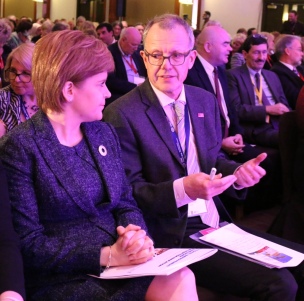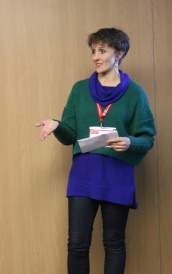At the beginning of January I had the privilege of being part of a team from the Philipps-University in Marburg that attended the 29th annual International Conference for School Effectiveness and Improvement (ICSEI) in Glasgow, Scotland. The purpose of our visit was to present a symposium on our post-professional masters course. As the conference took place in the British Isles, I will take the liberty of writing this blog entry in English. The conference was the biggest in ICSEI history, with 600 attendants from over 50 different countries. With its theme of connecting teachers, schools and systems and creating the conditions for effective learning, the conference offered a unique forum for practitioners, academics, policy makers and researchers to engage through keynote sessions, symposia and individual papers. There was a bewildering array of choices in the programme that instantly made me wish I had brought along a couple of clones in order to attend several events simultaneously.

Nicola Sturgeon with ICSEI president, Michael Schratz
The event was opened by an impressive speech from Nicola Sturgeon, First Minister of Scotland, who reviewed the conclusions of the OECD assessment and introduced the new National Improvement Framework for Scottish schools. Although a lot has been achieved, a large attainment gap still exists with school leavers from the most deprived 20% of areas currently only doing half as well as school leavers from more privileged areas. I recently read very similar statistics for pupils in parts of Berlin. The question that arises for me is, will another programme make a decisive difference? I recently read a fascinating essay by the Finnish educational expert, Pasi Sahlberg, tracing the reasons for the Finnish success story. He raises an interesting premise about the old school system (pre-1950): Inequality in Finnish society was maintained and actually increased by the prevalent educational structure. This is a horrifying thought. Significant change in Finland was initiated by a re-thinking of educational aims and by empowering and networking the individual teachers. Interestingly enough, Finnish teachers work less than their colleagues in other nations. (Sahlberg. P. (2011) Paradoxes of educational improvement: The Finnish experience, Scottish Educational Review, 43 (1), 3-23).
A personal highlight was a dynamic session with a team from the IJburg College in Amsterdam, who led us through a mock-assessment meeting to demonstrate how they select teachers applying for jobs. Their innovative approach was absolutely invigorating. We were divided into groups and asked to collaborate by preparing an interdisciplinary school project. This process is implemented to observe interaction, team competence and participation within a group and seems an excellent and practical way to identify potential members of staff best suited to their particular learning community. This is definitely a school I would be very interested in visiting.

Symposium
We presented our symposium on Friday to a highly attentive audience. During our preparation I was struck by the unique aspect of our post-graduate course. It aims to impact the interface between schools and artists working in Cultural Education and make an innovative contribution to school development. Now nearing the end of the course, I understand why some of the school projects I had previously been involved in were fraught with difficulties. I had little understanding of the German school system and often felt that the validity of my artistic contribution to the educational process was neither recognised or utilised. Our course promotes a greater understanding between artists and teachers so that artists can be incorporated into a school community rather than merely being imported as an exotic animator.
On the final day of the conference I attended a symposium chaired by David Frost from Cambridge University, who co-directs the International Teacher Leadership project. Hanan Ramahi, currently studying in Cambridge, gave an impassioned review of the revolutionary and positive impact this training has had in one particular Palestinian school. Positive change effected by an empowerment and emancipation of the individual teacher within a strong support network.
The evenings were skillfully planned to reveal Glasgow’s dynamic cultural heritage. We were invited to a civic reception at the impressive City Chambers and a delightful evening at the Hungarian Museum with Burns poetry and whisky tasting. The absolute highlight was a gala evening at the Science Museum where we took to the floor for a vigorous Scottish ceilidh. Glasgow is well worth a visit. I returned with fresh insight into global developments and strategies in education and am grateful to have been part of such a compatible team.
Klicke, um auf Paradoxes-of-improvement-SER-2011.pdf zuzugreifen


